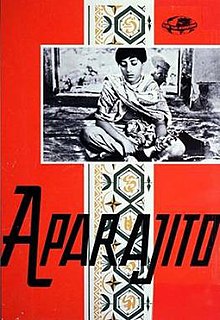
Back অপরাজিত (চলচ্চিত্র) Bengali/Bangla Aparajito Catalan Den ubesejrede Danish Apus Weg ins Leben: Der Unbesiegbare German Ο ανίκητος (ταινία, 1956) Greek Aparajito Spanish آپاراجیتو Persian Voittamaton (vuoden 1956 elokuva) Finnish L'Invaincu French Aparajito Galician
| Aparajito | |
|---|---|
 Theatrical release poster | |
| Directed by | Satyajit Ray |
| Screenplay by | Satyajit Ray |
| Based on | Pather Panchali and Aparajito by Bibhutibhushan Bandopadhyay |
| Produced by | Epic Films (Satyajit Ray) |
| Starring |
|
| Cinematography | Subrata Mitra |
| Edited by | Dulal Dutta |
| Music by | Ravi Shankar |
Production company | |
| Distributed by | Merchant Ivory Productions |
Release date |
|
Running time | 113 minutes |
| Country | India |
| Language | Bengali |
Aparajito (Bengali: অপরাজিত Ôporajito; The Unvanquished) is a 1956 Indian Bengali-language drama film written and directed by Satyajit Ray, and is the second part of The Apu Trilogy. It is adapted from the first half of Bibhutibhushan Bannerjee's novel Aparajito.[1] It starts off where the previous film Pather Panchali (1955) ended, with Apu's family moving to Varanasi, and chronicles Apu's life from childhood to adolescence in college.
When Ray started making Pather Panchali, he had no plans of following it up with a sequel. The critical and commercial success of the film prompted him to start making Aparajito.[2] Unlike his previous venture, where he stayed faithful to the novel, Ray took some bold artistic decisions here, such as portraying the relationship between Apu and his mother in a very different manner from the book. As a result, in contrast to its predecessor, the film was not received well locally; Ray recalled that "as for the suburban audience, it was shocked by the portrayal of the mother and son relationship, so sharply at variance with the conventional notion of mutual sweetness and devotion".[3]
Critical reception outside of India, however, was overwhelmingly positive. It won 11 international awards, including the Golden Lion and Critics Award at the Venice Film Festival, becoming the first ever film to win both.[4] Veteran film-maker Mrinal Sen said he considers it to be one of the best Indian movies he had ever seen.[5] Bosley Crowther said that "it is done with such rare feeling and skill at pictorial imagery, and with such sympathetic understanding of Indian character on the part of Mr. Ray, that it develops a sort of hypnotism for the serene and tolerant viewer".[6] The critical acclaim this movie received encouraged Ray to make another sequel, Apur Sansar (1959), which was equally well received, and thus concluded one of the most critically acclaimed movie trilogies of all time, as Roger Ebert later pointed out: "The three films ... swept the top prizes at Cannes, Venice and London, and created a new cinema for India – whose prolific film industry had traditionally stayed within the narrow confines of swashbuckling musical romances. Never before had one man had such a decisive impact on the films of his culture".[7]
- ^ Robinson 2003, p. 94
- ^ Ray 2013, p. 63.
- ^ Ray 2013, p. 42.
- ^ Ray 2012, pp. 168.
- ^ Das Gupta, Ranjan (2010). "I don't rank my films: Mrinal Sen". The Hindu. Retrieved 20 September 2014.
- ^ Crowther, Bosley (29 April 1959). "The Screen: 'Aparajito'; Indian Movie Continues 'Pather Panchali' Story". The New York Times. Retrieved 20 September 2014.
- ^ Ebert, Roger (4 March 2001). "The Apu Trilogy". Retrieved 24 September 2014.